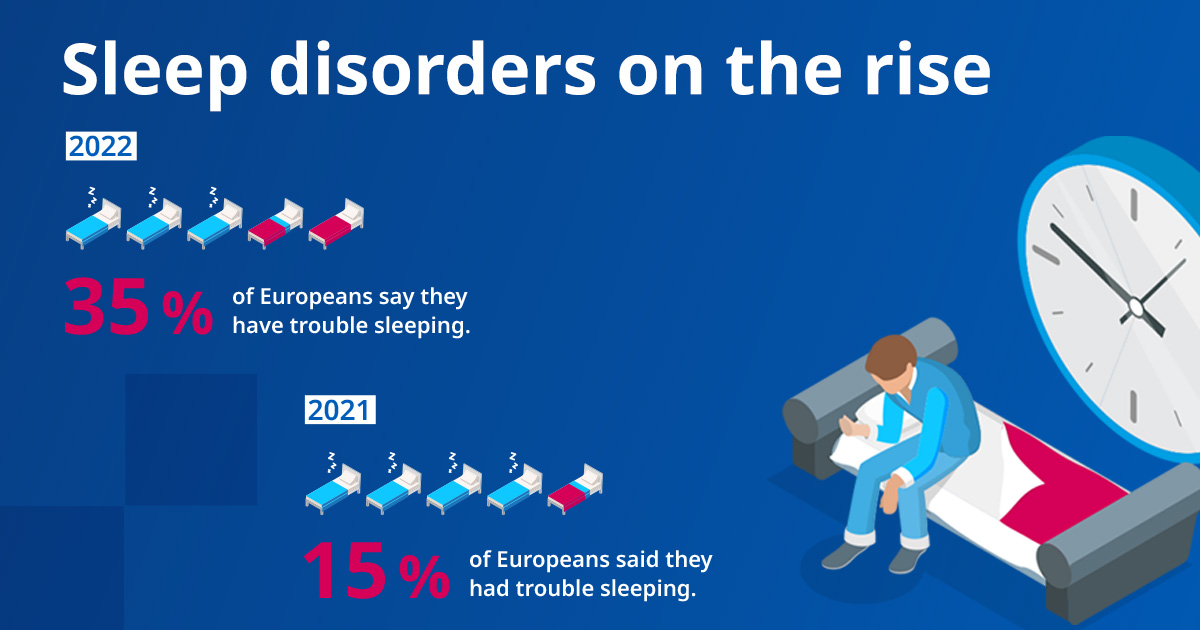06. September 2022.
As many as 78 percent of Europeans hardly manage to sleep through the night, warns Stada’s Health survey, which included over 30,000 respondents in 15 countries, including Serbia.
Sleep is a basic human need, like water and food. We spend one-third of our lives sleeping, which is precious time for our body to invigorate and restore itself. Insufficient sleep over a long period of time can seriously impair and permanently damage our overall health. Therefore, it is worrying that only one in five Europeans sleeps uninterrupted at night, and one in three warns that they sleep worse now than before the Covid-19 pandemic.
Belgians have the most trouble sleeping, 46% of them claim that they do not sleep well. They are followed by the British, among whom 8% spend sleepless nights, and 35% sleep badly. Regarding Serbia, 29% of citizens complain of poor sleep, which is below the European average of 35%. The Dutch sleep the best in Europe. 72% of them describe their sleep as good.
Everyday problems, anxiety, and financial worries keep Europeans awake
Women in Europe lie awake thinking about problems more often, 38% of them compared to 29% of men. The sleep of 47% of Poles and 40% of Spaniards is most often disturbed by daily worries. The citizens of Serbia are not far behind, 34% of whom cannot sleep because of everyday problems, and as much as 31% because of fears and bad thoughts, which is above the European average of 26%.
However, anxiety troubles Italians the most, and as many as 42% of them are awake at night due to fears and feelings of anxiety. 25% of Portuguese people do not sleep because of financial worries. The sleeping of 21% of British people is disturbed by urinary problems, 18% of Germans are bothered by noise from the environment, while 17% of the French and 16% of the Dutch are disturbed by their partner's snoring.
Prejudice against sleeping medicines
Europeans are divided when it comes to sleep products, Stada survey shows. Despite poor sleep, 53% of Europeans and the same number of Serbian citizens refuse sleeping pills or drops. Even more decisive are the Dutch 61%, Czechs 61%, Romanians 60% and Austrians 60%. The biggest opponents of sleeping products are citizens of Kazakhstan, as many as 69% of them. The fear of possible addiction to these products is particularly pronounced in the Czech Republic 25% and Kazakhstan 24%. The expectation of undesirable side effects prevents 13% of Europeans from taking sleeping pills. The idea of buying these products is particularly unpleasant for the citizens of Austria 22% and Belgium 18%.
At the same time, the other half of Europeans, 47%, wholeheartedly support the use of sleep aids. The Spaniards are in the lead at 59%, Italians at 58%, and Poles at 57%. In Serbia, 47% of citizens consider the mentioned products useful, among which 26% point out that they would only use them on doctor's recommendation.
CBD-based products most popular among European youth
Interest in sleep aids based on CBD, a calming ingredient extracted from the leaves of the female hemp plant, strongly correlates with age. Among Europeans over the age of 55, 42% can imagine using these products, while the percentage is significantly higher among those aged 18 to 34 and amounts to 55%. Fear of possible addiction is the most common reason to be wary of CBD products, the same as with all other sleep aids.
